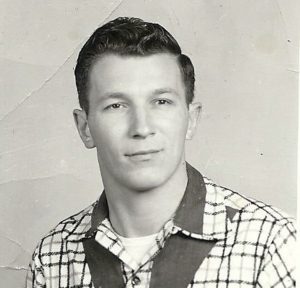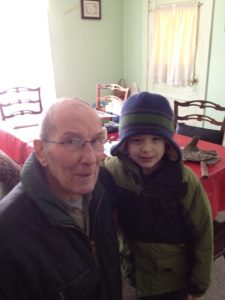It was a bitter irony, the contrast in weather for our send-offs for my Mom and my Dad. Mom hated winter, but the week of her funeral almost three years ago was a nearly non-stop blizzard in our Upper Peninsula hometown of Ironwood, Michigan. This week, as we said goodbye to Dad, was one of those gorgeous but all-too-rare crystalline late-summer weeks of warm sunny days and clear chilly nights. Mom would’ve loved it – except to note that the chill meant another hated winter was coming.
They’re together again, as it should be. I’m glad my Mom has him back with her. But the world lost a very good man this month.
I knew of his many accomplishments, but was proud (and a bit humbled) to read them all gathered together for his obituary: Air Force photographer. Bachelor’s degree in Forestry. Career with the US Forest Service, including a term as Forest Ranger in my birth state of West Virginia. Two-time District Governor with the Lions Club, and recipient of its Melvin Jones Fellowship Award. School Board President. Volunteer in endless ways with the Catholic church.
But most important, husband to my Mom for sixty years, and father to my six siblings and me.
Husband and father weren’t most important on their own. Most men are husbands, and most men are fathers. Big deal.
But they were a big deal to Dad. He lived during the time when career took over for men as the be-all and end-all of supposed success. Dad wasn’t immune to that societal pressure; he wanted more from his career, but he didn’t get it from the Forest Service.
And he didn’t put it first. He put us first.
Right now I just happen to be reading The Right Stuff, Tom Wolfe’s legendary recounting of the exploits of the test pilots and astronauts who took America into space. Just this morning I came across this passage, about Gus Grissom’s wife Betty:
By now Betty knew what to expect from Gus personally; which is to say, she seldom saw him. In one 365-day period he had been with her a total of sixty days. About six months before, Betty had had to go into the hospital near Langley for exploratory surgery. There was a good chance that she would require a hysterectomy.
Betty had a real siege in the hospital. She was there for twenty-one days. She was there for so long she had to get some of her relatives to fly in from Indiana to look after the boys. Gus managed to make it to see her in the hospital exactly once and he didn’t quite make it through the entire visiting hour. He got a call right there in the hospital asking him to return to the base, and he left.
I have nothing but admiration for what our astronauts accomplished back then, and the “right stuff” of the book is largely about the courage it took for them to willingly be strapped in atop a giant bullet-shaped bomb. Kudos to them for that.
But they were also perfect caricatures of today’s definition of success: climbing atop a career ladder with self-regard being the #1 driving force, and with family being the first thing to be sacrificed along the way.
Now, my Dad certainly had the courage of the kind celebrated in the book. Because the one regularly-occurring stretch of time he would spend away from us, his family, was just about every summer while I grew up, when he headed out west to fight forest fires for weeks at a time. One of his office colleagues and fire-fighting compatriots shared with me in the receiving line at his funeral that Dad was “the best fire-crew chief I’ve ever known.” He was in charge of groups of guys who went in knowing all too well that if things went wrong, or if they screwed up, they would die. Montana’s 1949 Mann Gulch disaster was a constant in their training, and had to be ever-present in their minds when they went in.
So yes, Dad had that kind of courage, without a doubt.
He would disappear for those long stretches during our summers, then come home and all would be normal. And it was during those normal times that, to me, Dad showed even greater courage by rejecting the career definition of success.
Because, unlike America’s astronaut heroes (and all too many common Joes too), Dad was there. For most of those years when we were growing up, when he was at home, Dad left for work at the same time every morning and got home at the same time every afternoon – and was always there for our oddly early family dinners, every single evening. Church every Sunday morning? He was there. My siblings or I had a basketball game? He was there. Mom was in the hospital after discovering nearly too late that she had become diabetic? He was there. First Communion? Confirmation? Graduation? There, there, there.
Dad’s government job gave him oodles and oodles of vacation time, and he would take us (once he finally decided to get in the car on the day of departure) on weeks-long vacations to see Mom’s family in the high desert of southern Oregon, or his family in his riverfront hometown south of Pittsburgh – plus all the many sights along the way on the trips out and back. Those trips were long and hot and crowded (all of us in a single station wagon!), and could therefore be terribly frustrating – and they’re memories I treasure today.
Dad was stern and taciturn. I loved my oldest brother John’s comment in his eulogy that he was still waiting to hear from Dad if he could have the car for his senior prom. He was gruff but something of a softie, as our friend Pete discovered, leading him to give Dad a tongue-in-cheek nickname that we still use today: Bruiser. But he was also funny and fun-loving, to the surprise of many who didn’t know him well. I’ll always remember the time he found me on the couch and asked me to help him reach a spot he couldn’t while he was cleaning our bathroom ceiling. He handed me a wet rag and told me to grab onto the shower spigot while I washed around the light fixture. When the rag touched the base of the light, I got an instant electric shock that almost knocked me to the floor. And he laughed his ass off – he’d done the same thing himself, discovering that there was an electrical short of the light’s wiring to the metal base, and had decided to share the fun with me.
Mom and Dad were hoarders, who found it nearly impossible – as did many others who survived the Great Depression – to throw anything away. We’ve grumbled about that for years. Now my brothers and sister and I will have to go back to Ironwood and go through a whole lifetime of pictures and documents and toys and cards and furniture and knickknacks and memories. That will be an unbelievable amount of work. And other than decades of their love and support, and that most precious gift of all, their time, I wonder if it won’t be the best present Mom and Dad ever gave us.
Dad was proud of his Polish descent, and when I was still very young he introduced us to the Polish “good night.” From that time on, it’s how I always said “good night” to him.
Goodbye, Dad. I love you. Dobranoc.



Chris Johnson
August 26th, 2019
My friend Jim. You father was quite a man and I now see how you turned out the way you did. He taught you values … the same kind I was taught growing up. You my friend are a leader, a scholar, a true friend who has a heart for people. A genuine leader has all of the things I mentioned. I lost my dad one year ago in July. He was just an average guy who was a blue collar worker but could do anything he set his mind to. We grew up poor I suppose but never went with out. My dad wanted to get a bigger home for my mother. He took his chain saw into the woods and started cutting trees. He had never built a home . He worked on it for three years… a modest ranch style house. At the end of the three years it was fully finished and paid for. He told me he would go over the plans at night when he had gone to bed in his mind. He too had us in church every Sunday. He was 19 and my mom was 18 when they married. My mother is in a nursing home with not long to live. I dread the day she leaves but know she will be with him and our Lord and Savior Jesus Christ. I feel for you brother and know how hard times like these are but you and I have the assurance we will see our parents again. You are one class act and a fine gentleman Jim. I am so glad to know you.
David Allen
August 26th, 2019
Jim, a wonderful remembrance of your father. Many of our parents born in the early part of the 20th century were people who had to work hard to take care of their families. My wife and I lost all four parents in a 6 year period in in the late 80’s and early 90’s. A tough time for sure. But we never felt we were without anything because of the families we were in…… God bless you and your family.
jim
August 26th, 2019
David, thanks so much. And you’re exactly right – it’s the support of family that makes such a trying time bearable.
jim
August 26th, 2019
Chris, it sounds as though you’ve been just as blessed as I have. I’m very sorry to hear about your Mother’s situation – it was what we went through with Dad and it’s such a tough time. I send you prayers as well, and all my best wishes, old friend. Thank you for your very kind words.